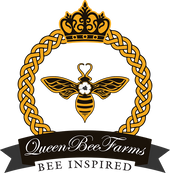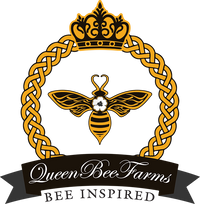Bee Friendly Farming
Healthy Bees. Healthy Food. Healthy People.
Our philosophy at Queen Bee Farms is that conserving and creating healthy pollinator habitat is not just an option, but a necessity. Without the hard work done by our pollinator friends, the bees, the butterflies, hummingbirds, bats, and many others, we all would not benefit from and enjoy the many foods that we eat daily. In short, pollinators are indispensable by providing ecosystem services for agriculture and healthy natural ecosystems. Farmers and beekeepers, like ourselves, are on the front line in playing a critical role for their wellbeing and survival.
WHY WE CARE ABOUT POLLINATORS
• They pollinate 2/3rd of the plants on earth
• Produce that is properly pollinated increases production on our farm and improves the quality of our bee inspired products
• Fostering populations of pollinators and caring for their wellbeing helps to ensure the sustainability of our operations and the sustainability of our local environment
• Pollinators include many complex social species that bring joy and beauty to local ecosystems - they to have a right to live happy and healthy lives
WHY YOU SHOULD CARE ABOUT POLLINATORS
• Pollinators are essential in the growing of flowers, fruits, herbs, nuts,
and vegetables - without them most of the food we rely on would not exist
• Many pollinator populations are in general decline and caring for pollinators helps farmers grow more and produce higher quality food, as well as greatly benefiting the environment as a whole
• By purchasing products from Bee Friendly Farmers you are a part of the solution to help save and support our pollinator friends
BEE FRIENDLY FARMING BASICS
• Plant and sow seeds of flower plants to bloom during the entire foraging season
• Provide ample variety of pollen and nectar sources to aid in bee nutrition and health
• Leave areas of the farm undisturbed and “wild” with with features such as
rock cavities, branches and forest debris
• Avoid the use of pesticides, especially never during bloom times
• Ensure there is a nearby source of clean fresh water
• Restore pollinator habitat to support all beneficial insects

